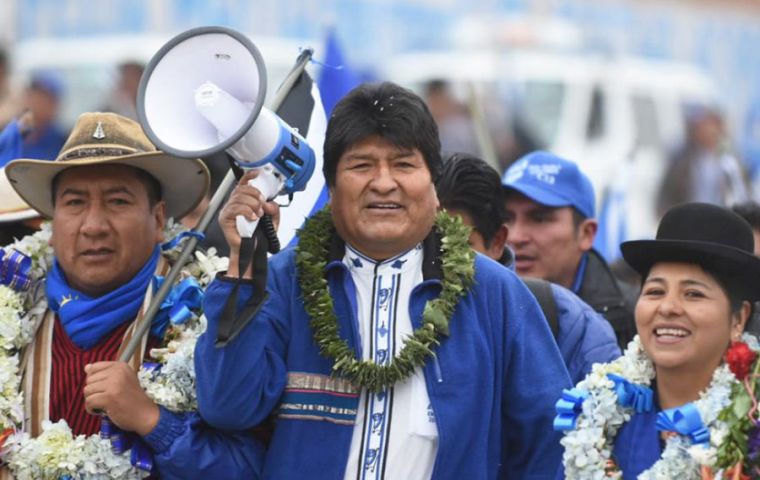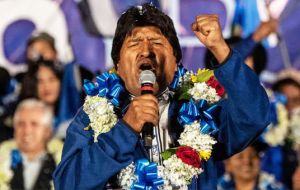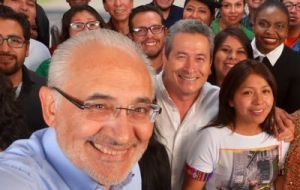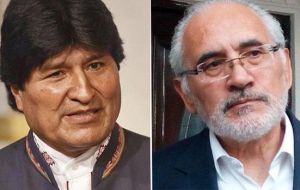MercoPress. South Atlantic News Agency
Bolivia votes on Sunday, but Morales 13-year in office seems to have lost its magic
 “Don't desert me on October 20,” Morales pleaded with thousands of supporters at a rally in the sprawling satellite town of El Alto, which overlooks La Paz
“Don't desert me on October 20,” Morales pleaded with thousands of supporters at a rally in the sprawling satellite town of El Alto, which overlooks La Paz  “I ask you for five more years to complete our great projects,” he told supporters at one stop, wearing the blue of his Movement for Socialism (MAS) party.
“I ask you for five more years to complete our great projects,” he told supporters at one stop, wearing the blue of his Movement for Socialism (MAS) party.  Speaking in Santa Cruz Mesa told his followers: “On October 20, Bolivia will defeat almost 14 years of authoritarianism.” His supporters chanted “Democracy!”
Speaking in Santa Cruz Mesa told his followers: “On October 20, Bolivia will defeat almost 14 years of authoritarianism.” His supporters chanted “Democracy!”  One of the last polls shows Morales with 32.3% support to Carlos Mesa's 27%. Such a result would force a second round run-off on December 15.
One of the last polls shows Morales with 32.3% support to Carlos Mesa's 27%. Such a result would force a second round run-off on December 15. Bolivia's Evo Morales will seek a controversial fourth term as president on Sunday when voters head to the polls in what is expected to be a tight race for the once-popular left-wing leader. Morales is already the longest-serving president in Bolivian history, having been at the helm for 13 years, and its first indigenous president.
But he stands accused of corruption and many are miffed at his refusal to step aside, even though the South American country's constitution bars him from running.
In opposition leader and former president Carlos Mesa, Morales -- who has easily won reelection in the past -- faces perhaps the stiffest challenge yet to his authority.
“Don't desert me on October 20,” Morales pleaded with thousands of supporters at a rally on Wednesday in the sprawling satellite town of El Alto, which overlooks La Paz, Bolivia's seat of government.
Morales has been on a nationwide campaign trip to reach as many of Bolivia's 11 million people as possible. “I ask you for five more years to complete our great projects,” he told supporters at one stop, wearing the blue of his Movement for Socialism (MAS) party.
But his popularity has fallen sharply since his previous elections. One of the last polls, from the state-run university, shows Morales with 32.3% support to Mesa's 27%. Such a result would force a second round run-off on December 15.
“I think anything can happen,” said Amaru Villanueva, who is handling election analysis for the Friedrich-Ebert-Stiftung Foundation in Bolivia.
Mesa has no party of his own but is backed by a minor center-left party. He also has support from a collective of other small parties. The journalist and historian, who was president from 2003-2005, was a vocal critic of Morales even before announcing his latest run for office.
Speaking in Santa Cruz, an opposition stronghold, Mesa told his followers: “On October 20, Bolivia will defeat almost 14 years of authoritarianism.” His supporters chanted “Democracy!” in response.
Bolivia's 2009 constitution, promulgated by Morales himself, limits a president to two consecutive terms of office. Then in a 2016 referendum, voters defeated Morales's bid to secure public support to remove term limits, but his government rejected the result.
The constitutional court, filled with Morales loyalists, ruled it was his right to seek reelection.
“These are the most unfair elections in history because they're being run by a party that has been in government for 13 years and is in control of all” branches of government, said Lola Terrazas, a candidate for the legislature.
Morales points to a decade of economic stability and considerable industrialization as his achievements, while insisting he's brought “dignity” to Bolivia's indigenous population, the largest in Latin America.
But he came under severe criticism earlier this year as wildfires in August and September ravaged Bolivia's forests and grasslands, with activists saying his policies encouraged blazes to clear farmland. A non-governmental organization said more than four million hectares were destroyed.
The outcry that followed, particularly among indigenous communities, has helped boost Mesa's candidacy. “He's not going to stay forever -- it's already been too long,” Mesa said Wednesday about his rival.
None of the other candidates are expected to come close to challenging the top two, but neither Morales nor Mesa is likely to win outright.
“Whatever happens, the winner won't have a majority,” said Ibo Blazicevic, president of private non-profit National Chamber of Industries, quoted by the Catholic news agency Fides. Even if Morales comes out ahead on Sunday, Mesa should perform considerably better in a second round, experts say.
In the previous two elections, Morales won more than 60% of the vote. Beyond the presidential contest, his party is expected to lose control of Congress.




Top Comments
Disclaimer & comment rulesCommenting for this story is now closed.
If you have a Facebook account, become a fan and comment on our Facebook Page!